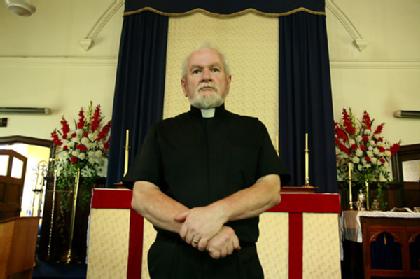
Dutch lawmaker Geert Wilders. Reuters
By Joel Mowbray
A member of parliament in the Netherlands who has been charged with “insulting” Muslims says he fears he will be found guilty and sent to prison in only a few months.
An appeals court on Wednesday overturned a previous decision by prosecutors not to charge Geert Wilders, and ordered that he stand trial.
“The decision of the court today was so strong that there is a real chance unfortunately that there will be a guilty verdict,” Wilders told FOXNews.com. “In fact, it was so bluntly motivated that it already looks like a verdict instead of just ordering the public prosecutor to start a trial.”
Wilders, who produced a controversial film that was highly critical of the Koran last year, says he faces a maximum of two years in prison if convicted. He said he had expected to be charged, and he has retained legal assistance from a U.S.-based nonprofit to help him defend himself.
Prosecutors initially declined last year to charge the right wing politician after he issued his short film, “Fitna,” which juxtaposes Koranic verses over footage of violence committed by Islamic terrorists.
But, the Netherlands allows private citizens to petition the courts to compel prosecution. In Wilders’ case, eight parties, including a politician from an opposing party, asked the courts to force prosecutors to bring criminal charges.
A three-judge appeals panel on Wednesday ruled that Wilders’ insults to Islam were so egregious that the principle of free speech was not sufficient defense.
“The court considers [Wilders’ film] so insulting for Muslims that it is in the public interest to prosecute Wilders,” a summary of the court’s decision said. The court explained that Wilders’ claims in “Fitna” and other media statements were “one-sided generalizations … which can amount to inciting hatred.”
Wilders on Wednesday defiantly stood by the public statements that could put him in prison.
“I lost my freedom already four and a half years ago in October 2004, when my 24-hour police protection started because of threats by Muslims in Holland and abroad to kill me,” he said.
“So of course I don’t want to go to jail as a criminal, but I don’t fear losing my freedom since I already lost my freedom in 2004.”
For several months, Wilders has been receiving pro bono assistance from a U.S.-based nonprofit called the Legal Project, whose aim is to protect free speech in what it says is a worldwide campaign to silence critics of “militant” Islam.
Middle East scholar Daniel Pipes founded the Legal Project following a slew of cases in which authors and activists were sued for alleged hate speech against Muslims and Islam, including several cases in the United States.
“The Legal Project helped me when I was in the United States, arranging meetings with important legal scholars and elected officials,” Wilders told FOXNews.com. “They also helped bring public attention to my case, which hopefully will help me raise money for my legal defense fund.”
Brooke Goldstein, a human rights attorney and director of the Legal Project, said Wilders’ case indicates that free speech is increasingly under assault. “Geert Wilders could be going to jail for making admittedly harsh criticisms of Islam that actually echo statements made by Muslims,” Goldstein said.
“Even if he prevails at trial, the damage to free speech will be done. Who wants to risk the time, cost and public harassment of a criminal trial?”
Goldstein said criminal prosecutions for hate speech or incitement are unlikely in the U.S. because of the First Amendment, but she said the mere threat of a lawsuit can stifle speech, especially when they concern corporations that must focus on turning a profit.
Even individuals participating in what they consider basic free-speech activities can find themselves in legal crosshairs, Goldstein said.
One Legal Project client is former CIA official and NYPD counterterrorism consultant Bruce Tefft, who was sued by a Muslim police officer for “workplace harassment” after he allegedly sent anti-Muslim e-mails to a voluntary recipient list of police officers.




 The CIA’s station chief in Algeria is under investigation for allegedly raping two Muslim women who claim their drinks were laced with a knock-out drug.
The CIA’s station chief in Algeria is under investigation for allegedly raping two Muslim women who claim their drinks were laced with a knock-out drug.
